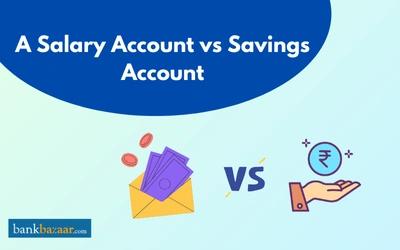Salary Account vs Savings Account
When choosing a bank account, it’s essential to understand the difference between a salary account and a savings account. While both serve the purpose of securely storing your money and offering banking services, they differ in terms of eligibility, features, and benefits.

What is a Salary Account?
A salary account is a type of bank account opened by an employer to credit an employee’s monthly salary. It often comes with added benefits like zero minimum balance, free debit card, and exclusive offers.
Key Features:
- Usually a zero-balance account
- Opened through employer tie-up with a bank
- Monthly salary credited directly
- Additional perks like cashback offers, free insurance, etc.
How to Open a Salary Account
- Meant for salaried employees and generally opened through an employer's partnership with a bank.
- The employer usually initiates the account opening process for new employees.
- Requires standard KYC documents, along with employee ID or offer letter as employment proof.
- Most salary accounts are zero balance accounts, depending on the employer-bank tie-up.
- Activation is often quicker due to bulk onboarding by the employer.
What is a Savings Account?
A savings account is a general-purpose bank account used by individuals to save money and earn interest. Anyone can open it, regardless of employment.
Key Features:
- Earns interest on deposited funds
- Requires maintaining a minimum balance (depends on bank type)
- Suitable for personal savings and routine expenses
- Can be opened individually or jointly
How to Open a Savings Account
- Available for any individual including students, homemakers, and senior citizens.
- Can be opened online through the bank’s website or mobile app, or offline by visiting a branch.
- Some banks may require a minimum balance to open an account.
- Account activation usually takes 24-48 hours post verification.
Salary Account vs Savings Account - Key Differences
Criteria | Salary Account | Savings Account |
Eligibility | Salaried individuals via employer | Anyone (individuals, students, homemakers, etc.) |
Purpose | Salary credit and daily expenses | Saving money and earning interest |
Minimum Balance | Generally, zero balance | Minimum balance required |
Interest Rate | Similar to savings account | Interest earning varies by bank |
Conversion | Converts to savings account if salary not credited for 3+ months | Remains active if minimum balance maintained |
Perks | Additional employee-centric offers | Limited to basic banking benefits |
Similarities Between a Savings Account and a Salary Account
Feature | Description |
Digital Banking | Both accounts offer internet and mobile banking for seamless access. |
ATM Services | Cash withdrawals, balance checks, and mini statements are supported. |
Transaction Alerts | Real-time SMS and email notifications for account activity. |
Fund Transfers | Support for NEFT, IMPS, and RTGS for sending and receiving money. |
Account Statements | Monthly statements or passbooks available to track transactions. |
Customer Support | Access to phone banking, email, and branch support for assistance. |
Which One Should You Choose?
- If you're a salaried professional with an employer tie-up, a salary account is convenient and cost-effective.
- If you're looking to save money independently or don’t have a fixed salary, a savings account is ideal.
FAQs on Salary Account vs Savings Account
- What is the main difference between a salary and a savings account?
A salary account is specifically for salaried individuals and usually comes with zero balance requirements, while a savings account is meant for general saving purposes and may require a minimum balance.
- Can I use my salary account after I leave my job?
Yes, you can continue using it, but the bank may convert it into a regular savings account if no salary is credited for a few months.
- Can I have both a salary and a savings account?
Yes, you can hold both types of accounts, even with the same bank.
- Is there a difference in interest rates between the two accounts?
Generally, no. Both accounts earn the same interest as per the bank's savings account interest rate.
- Can I open a salary account myself without employer involvement?
No, salary accounts are opened through employer-bank tie-ups. Individuals can open a savings account on their own.
- Which account is better for long-term savings?
A savings account is better for long-term savings, while a salary account is ideal for managing monthly income and expenses.

Disclaimer
Credit Card:
Credit Score:
Personal Loan:
Home Loan:
Fixed Deposit:
Copyright © 2026 BankBazaar.com.